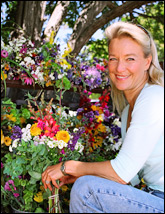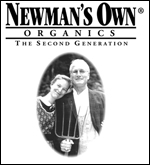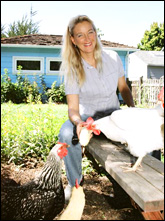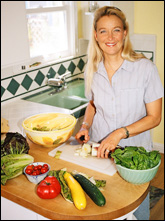
We have Thanksgiving to thank for the beloved Fig Newman. It was Nell Newman, daughter of actor Paul Newman, who actually created the eponymous product, but she had the opportunity only after convincing her father to take his food company, Newman’s Own, in an organic direction with a triumphant organic meal she whipped up for her family on Thanksgiving 1992.
The following year, Nell started an organic division of Newman’s Own more than a decade after the parent company was established, and has since become one of the most recognized names and faces in the health-food industry. That’s her on the Fig Newmans wrapper, standing next to “Pa” wearing calico and braids and wielding a pitchfork — bearing as much likeness to her movie-star mom, Joanne Woodward, as to her blue-eyed dad.

In person, however, Nell is nothing like the country bumpkin she appears to be on the packaging. Now 45, she’s a tough-talkin’, race-car-drivin’ surfer babe, and proud of it. Oh, and she’s a tree-hugger alright — she grows her own produce, catches her own fish, and lives in a solar-powered cabin. But she doesn’t carry any purer-than-thou pretenses.
Nell talked with Grist from her home in Santa Cruz, Calif., about the philosophy of her company, the troubles with big-business health food, and her life as a “flexitarian.”
First, I’ve got to clear one thing up: According to the back of the Newman’s Own Organics pretzels package, you bet your dad his house that you could come up with a better organic pretzel than the traditional ones he munched all the time. You won the bet, and he lost his house. Is that true?
That’s made up.
I’m crushed. You made it up?
Do you honestly think I live in Dad’s big house in Westport [Conn.]? God no! I live in a cabin in Santa Cruz. That story is just us trying to be funny. There are different stories for different products.
Have you ever read the back of the Newman’s Diavolo pasta sauce? Dad on the front is dressed like the devil with a little beard and horns. He says that he sells his soul to the devil for the recipe. It was banned in the South. They thought it was an abomination. Then an anti-violence organization gave him hell for a popcorn story that they said was overly violent because he says he goes to movies with his bag of homemade popcorn in one hand and machete in the other to cut off the hand of anybody who might try to take it away from him. Some anti-violence folks were just horrified.
I can’t help but laugh. So tell us the real story about how Newman’s Own Organics began.
It was Thanksgiving 1992. My dad was pretty skeptical about organics back then — he thought it was all heavy, dense, unappetizing stuff like nut loafs and yeast gravy and atomic muffins. So without telling him, I had an organic farm in California FedEx me a three-pound box of organic salad greens and peas and potatoes and I got ahold of an organic turkey, which was hard to find back then. I made my usual Thanksgiving dinner, exactly the way that Dad loves it, but with all organic ingredients. And when he started wiping his plate clean, I said, “So, how did you like your organic meal, Pa?” And he got the picture; that convinced him that organics could really take off.
So I started my own organics line under his name, and he agreed to cover expenses for the first year as long as I paid it all back, because it came out of money that normally goes to charity. We started the line in 1993 with the slogan “Great-tasting products that just happen to be organic,” and within one year I’d paid it all back.
Had you had much experience in business or environmentalism before that?
My background is in biology. Before getting into the family business, I worked at the Predatory Bird Research Group at the University of California at Santa Cruz, fundraising for them. They were involved in a captive breeding program for the peregrine falcon to reintroduce it to the wild, but as soon as the peregrine was down-listed from endangered to threatened, a whole bunch of our funding dried up. It went out the window — as though we’d done our job. It was very shortsighted for funders to just drop the cause like that. So I thought, well, why not do fundraising a little differently? Why not support a cause by investing in it, participating in it, sustaining it with profits?
So the founding vision of Newman’s Own Organics was that it would be a fundraising vehicle?
Yes, most definitely. It’s twofold: It’s supporting organic agriculture by actually growing the industry and then also being able to fund worthwhile organizations with the profits.
What are some of your favorite organizations that you’ve contributed to?
They’re all grassroots, everything from the Western Environmental Law Center to our favorite, which is the Organic Farming Research Foundation here in Santa Cruz. It’s the only nonprofit doing on-farm research. There’s also a senior citizens’ recycling program called Grey Bears, which I love; they even do worm compost.
You began Newman’s Own Organics more than 10 years ago, before organics was a fast-growing industry. Now it’s exploding. What do you think has been the driving force behind the movement?
Before we even entered the market, the industry had double-digit [annual] growth; it actually has for the last 20 years. But it was still kind of whole-wheaty when we came to the scene. I thought there was a great opportunity to make familiar products that people like my father would recognize and that don’t taste like cardboard. You know, if you’re going to make a pretzel, it’s got to look and taste like a pretzel, not a dog bone. The industry followed suit and realized that organics would only become mainstream with familiar products. Most people don’t want to change their whole mindset to support organic agriculture. Once the products became acceptable, people started demanding them: “How come I can’t find my Fig Newmans here at Safeway?” And it just kept catching on, especially as people became more concerned about growth hormones in cows and the health effects of pesticides, bioengineering, that sort of thing.
And the more demand, the higher the economies of scale, the more ingredients are available, the cheaper they are to produce — it’s a positive feedback loop.
Absolutely. There are hundreds of ingredients that we can get today that we couldn’t get 10 years ago simply because the market now exists for this stuff.
Should we be concerned that General Mills, Nabisco, and others are buying up organic companies left and right?
I think consolidation is part and parcel of the growth process, but not being a small farmer myself, I don’t have as much of a direct insight into that. I know that more and more, the growth of organic farms is happening, exponentially growing, at the same rate that the growth of the industry is happening.
Are critics’ concerns valid that the companies that are mainstreaming organics like Horizon and Whole Foods are operating according to big-business practices — consolidating, cost-cutting, importing ingredients from overseas, and so forth?
Oh, it’s good that someone’s mainstreaming this industry. Adopting big-business practices is one thing, and adopting agribusiness practices that would dilute the meaning of organic is another. On the whole, I think we’re doing a pretty good job of preserving the integrity of organic foods.
As for business practices, you have to be realistic. Even running a small organics company, I’ve got constraints. I would love to not have to ship anything and use nasty packaging, but you know what, that’s not a reality. You want to do everything regionally, and just support local small farmers regionally, and then you find out there are no good pretzel manufacturers anywhere on the West Coast, so you have to make your pretzels on the East Coast and ship them. So you do as best you can, but most of the time, it’s difficult to have those high ideals and stick to them, in terms of how you produce stuff. People would love us to put our pretzels in wax paper, but would they really like it when they bought a stale pretzel? It’s a very difficult balance.
Does your bottom line prevent you from make making certain decisions, like using 80 percent organic ingredients rather than 100 percent?
We have to be able to make enough money to pay Dad his royalty that he allows us to direct to charities. So we still have to make a profit. Our goal is always to be as close to 100 percent organic as possible, but for the moment it’s unrealistic. We have to be able to provide products for people that they’re willing to pay the cost for. You know, who’s going to buy the $8 bag of Fig Newmans that’s 100 percent organic?
So you could offer those products, but they’d be too expensive for a mainstream consumer?
Yes, and when you sell fewer fig bars, you’re supporting fewer organic fig growers. You’re supporting one farm instead of maybe five or six farms. At the time we started out, the market for organic figs was virtually nonexistent. The first fig farmer I talked to sold like two-thirds of her organic crop as conventional because no one wanted to buy organic figs. Within a year of when we began selling the organic fig bars, all the other fig-bar manufacturers began to use organic figs.
What do you think of the USDA organic standards? Are they strict enough?
If this particular administration doesn’t seek to continually try to dilute them. They were written by us, the organics industry, so they came from the right intent. We pretty much got what we asked for. I don’t do dairy or poultry, and I know there are some concerns in certain areas related to organic feed. The problem has mostly been to make sure that they’re maintained at that level.
What do you think about the Bush administration’s environmental policies in general?
I think they’re abominable. I mean, please, where do I start?
Can you describe the origins of your environmental awareness?
My interest in organics probably stemmed from the fact that I was an early ornithologist, I was fascinated by birds about as soon as I could walk. I was a falconer when I was about 13. I started reading about them and was really amazed by the qualities of the peregrine falcon, which can swoop at up to 200 miles an hour. And then of course the next sentence said they’re extinct east of the Mississippi because of the use of DDT. That’s a mind-boggling concept for a little kid — extinction. We had already killed off the Carolina parakeet and the passenger pigeon, which used to darken the skies for days. We shot them all and ate them.

Have you always incorporated environmental principles into your living habits?
My mother was a big influence on that. She was sort of an early environmentalist. We recycled, and we had apple trees and a couple of chickens, so it was a more grounded experience than some kids get. We had a river near my house in Connecticut growing up. I’d go run through the woods with my fishing rod and drag this pack of dogs we had with us and fish and bird watch. It was always part of my life, part of my awareness.
Now my home office is a solar-powered house and I have six chickens in the backyard. I don’t live off the land, but I grow a lot of my own produce. It depends on how much I travel. Like I just missed all of my green beans because I was traveling. But I don’t travel anywhere in July when it’s peach season, because my peach tree gives off amazing fruit.
Are you a vegetarian?
I was a vegetarian for three years as a kid. Now I am a “flexitarian.” My friends say it’s a PC name for hypocrite. I eat a little bit of everything. Ninety percent of what I eat is organic, and any meat I buy is organic, but when I go out to dinner, I don’t always investigate the ingredients. I don’t say no when I go to a friend’s for dinner and they’ve prepared a non-organic meal.

You’re an avid chef; what’s your favorite thing to cook?
I love eating stuff out of my garden. When it’s tomato season, I love fresh tomatoes with olive oil and balsamic and basil and pine nuts. I make my own salsa with tomatillos that I grow. I love just being able to go out into the backyard and pick a salad. When I fish every year I vacuum-seal all my salmon and eat that. I get really picky about my fish.
I also hear you have a weakness for sports cars, in particular your BMW coupe.
There are always trade-offs. Nobody’s a perfect environmentalist. Try as we might, you know, somebody always leaves the light on or something. So, people can’t be too judgmental about your life if you’re at least making an attempt. My dad taught me to race cars when I was a kid, and I’ve had a love for it ever since. And yes, I have a sports car, but I mostly drive a Subaru station wagon that I can put my surfboard on top of. I’ve actually done some research on the Prius, but it won’t fit my surfboard. The Ford Escape hybrid SUV could be a good option.
Does surfing inform your environmental vision?
It’s amazing, it’s humbling, it makes you respect the incredible force of the ocean. It’s so much bigger than you. It also really puts you in touch with it when it’s really dirty. I have one friend who has high levels of mercury, she’s discovered, and she’s wondering if it is from eating albacore or from being in the water, because there’s mercury in the water from mining and from air pollution.
What’s your dad’s favorite Newman’s Own Organics product?
He loves the pretzels, but the Newman-O’s [cream-filled chocolate cookies] are his favorite things.
What’s your favorite?
It’s always changing. It’s hard to sort of pick a favorite, like a favorite child. Right now, I really think the olive oil. Once you make snack foods for a living, you kind of don’t eat as many of them as you might think you would.

